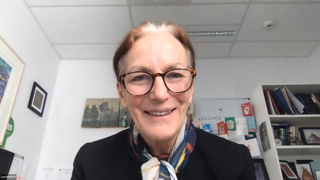
Prof Lyn March
An Australian-first biobank for arthritis and autoimmune disease, which will link information from biospecimens, patient-reported data and databases including the MBS and PBS, has gone live – with a long-term vision of finding a cure for arthritis.
Biobank Leader Professor Lyn March said the A3BC Biobank, which has been in development for several years, had now merged with the existing Australian Rheumatology Association Database (ARAD) registry.
Last week, A3BC nodes were launched around Australia to collect and store patient biospecimens, including blood, synovial tissue and fluid, faeces, urine, saliva and newborn screening cards.
The new nodes include centres in South Australia (led by Professor Catherine Hill and Associate Professor Mihir Wechalekar), Western Australia (led Professor Helen Keen) and Queensland (led by Professor Ranjeny Thomas). In NSW, samples will be stored in the NSW Health Statewide Biobank.
Professor March, Head of Rheumatology at Royal North Shore Hospital, said the biospecimen collection would enable researchers to undertake multi-omic studies to identify biological and environmental causes of musculoskeletal conditions – for example, genomics, proteomics, microbiomics and metabolomics, she said.
The Biobank also enabled the de-identified biospecimen data to be linked to the ARAD data as well as a broad range of other datasets including electronic medical records, pathology and medical imaging, MBS and PBS data, and state and national registry data such as cancer registries, she said.
“We have a big vision, it is a big undertaking,” she said. “By merging patient data and government data and now biospeciman data, it will help us to predict why people get arthritis, who is at risk, can we prevent it, who gets it badly, who needs treatment and which treatment.”
Initial focus
The initial focus is on rheumatoid arthritis, psoriatic arthritis, juvenile idiopathic arthritis, ankylosing spondylitis and vasculitis. Once established, the Biobank plans to expand to other high-burden MSK conditions such as Sjogren’s Syndrome, lower back pain, gout, scleroderma, systemic lupus erythematosus, myositis and osteoarthritis.
Professor March said there were around 3000-4000 patients already on the ARAD registry. It had been moved to a new online platform, with new questions included in the longitudinal survey on patients’ environmental and dietary exposures.
Some patients on the ARAD registry may be invited to donate biospecimens, and rheumatologists around the country were being encouraged to recruit new patients to provide biospecimens, she said.
An early priority was to gain funding to study which patients were likely to be early responders to medication and go into drug-free remission, with the aim of collecting biospecimens from about 300 newly diagnosed patients over 12 months.
Studies into the impact of oral arthritis medication on the gut microbiome were also underway, Professor March said.
Paediatric SIG
A paediatric rheumatology special interest group, working with the Juvenile Arthritis Foundation of Australia (JAFA), was partnering with the Biobank to focus on collecting paediatric samples for studies into juvenile disease, she said.
Professor March said the Biobank was a collaborative project, and the network already included more than 70 rheumatology clinicians and researchers and more than 60 recruitment sites, biobanks and laboratories in public and private hospitals.
“This has got real potential to contribute to the scientific knowledge within a few years, if we all get together and actively recruit patients,” she said. “There is no other national set up like this anywhere else in the world that does this level of data integration.”
The Biobank is sponsored by the University of Sydney and was established with philanthropic funding from the Clearbridge Foundation and grant funding from NSW Health and pharmaceutical companies Janssen, Roche and Abbvie. Matched node funding has been provided by: The Hospital Research Foundation, Royal Perth Hospital, the Murdoch Children’s Research Institute, SA Health, Flinders Medical Centre and the University of Queensland.